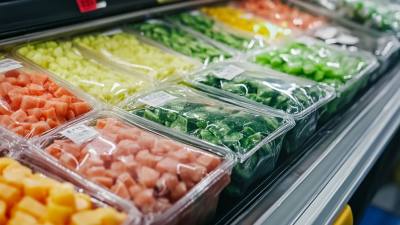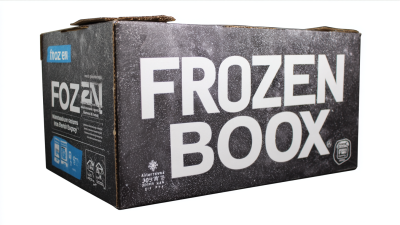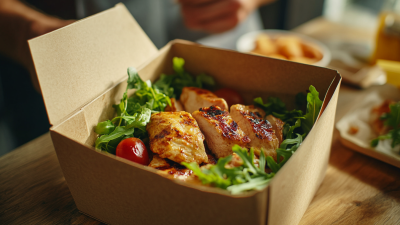What Are Frozen Food Bags and How Do They Revolutionize Food Storage?
In recent years, the food storage industry has undergone a significant transformation, largely attributed to innovations like Frozen Food Bags. These specialized bags provide an effective solution for preserving the quality and nutritional value of food while reducing waste. According to a report by the Food Marketing Institute, approximately 30-40% of food produced in the U.S. is wasted, often due to inadequate storage methods. Frozen Food Bags have emerged as a game-changer, allowing consumers to extend the shelf life of perishables, minimize freezer burn, and portion meals conveniently, all while maintaining the integrity of flavors and textures. As the trend toward convenience and sustainability continues to rise, understanding how to effectively use Frozen Food Bags becomes essential for savvy shoppers looking to revolutionize their food storage practices.

Understanding Frozen Food Bags: Basics and Benefits
Frozen food bags are designed to enhance food storage by preventing freezer burn and prolonging shelf life, making meal prep convenient for busy households. According to a report by the Food Marketing Institute, more than 50% of American consumers regularly use frozen food, highlighting the growing reliance on these products. The use of high-quality, airtight frozen food bags allows users to maintain the freshness and nutritional value of their food for an extended period. These specially designed bags are crafted from durable materials that withstand low temperatures, ensuring that food retains its flavor and texture.
Additionally, frozen food bags are not just beneficial for the individual consumer but also for the food industry at large. The Global Frozen Food Market is projected to reach USD 600 billion by 2024, driven by increased consumer demand for convenient meal solutions. The ability to easily portion and store ingredients or prepared meals in these bags contributes to less food waste and optimal meal management. With features like BPA-free materials and resealable options, these bags cater to the evolving market's needs, emphasizing sustainability and consumer health.
Benefits of Using Frozen Food Bags
The Science of Food Preservation: How Frozen Food Bags Maintain Freshness
Frozen food bags are a game changer in food storage, utilizing advanced sealing techniques and materials designed to preserve freshness. According to a report by the USDA, proper freezing can maintain food quality for up to a year, effectively slowing down the degradation of nutrients and flavors. The science behind frozen food preservation lies in the prevention of freezer burn, where moisture loss can compromise the texture and taste of food. High-quality frozen food bags, particularly those featuring multi-layer designs, can enhance insulation and reduce air exposure, further preserving the aroma and integrity of the stored items.
**Tips for Using Frozen Food Bags:**
1. Ensure that the food is well-cooled before sealing it in the bags; this minimizes condensation that can lead to ice crystals forming during freezing.
2. Remove as much air as possible before sealing the bag to reduce the risk of freezer burn. Consider using a vacuum sealer for optimal results.
Utilizing frozen food bags not only promotes long-term freshness but also contributes to reducing food waste. The Harvard Food Lab found that approximately 30-40% of food produced in the U.S. is wasted. By storing food properly in frozen food bags, consumers can extend its shelf life and enjoy it long after the initial purchase, making conscious food storage a vital practice for both sustainability and economy.
What Are Frozen Food Bags and How Do They Revolutionize Food Storage?
| Dimension | Description |
|---|---|
| Material | Multilayer polyethylene to prevent moisture and air infiltration. |
| Thickness | Typically ranges from 3 to 6 mils for optimal durability. |
| Sealing Method | Vacuum seal or heat seal to eliminate air and prevent freezer burn. |
| Freezer Storage Duration | Can extend food freshness from 6 months up to 2 years depending on contents. |
| Temperature Range | Effective in temperatures as low as -40°F (-40°C). |
| Environmental Impact | Made from recyclable materials to reduce waste. |
| Usage Benefits | Reduces food spoilage, saves money, and provides meal convenience. |
Market Trends: The Rise in Popularity of Frozen Food Storage Solutions
The popularity of frozen food storage solutions has surged in recent years, reflecting a significant shift in consumer behavior. According to a report by the Frozen Food Institute, the market for frozen foods is projected to reach $293 billion by 2028, growing at a compound annual growth rate (CAGR) of 4.5%. This trend is driven by busy lifestyles and the increasing demand for convenience, as more shoppers turn to frozen options for meal preparation and quick snacking.
Additionally, the rise in the popularity of frozen food bags has transformed how consumers approach meal storage. These innovative packaging solutions not only enhance the shelf life of food items but also provide a practical way to portion meals. A survey by the Food Marketing Institute revealed that 65% of consumers consider portion control when purchasing frozen foods, highlighting a growing awareness of healthy eating practices. As frozen food storage solutions continue to evolve, they are likely to play a crucial role in shaping the future of food consumption and storage, making them an essential part of modern kitchens.

Economic Impact: Cost Savings of Using Frozen Food Bags for Households
Frozen food bags have emerged as a game-changer in household food storage, bringing significant economic benefits to families. By allowing people to store meals and ingredients in a manner that maintains their freshness and flavor, these bags help reduce food waste. With the ability to freeze food in portion sizes, households can buy in bulk and save money on monthly grocery bills while ensuring that leftovers don’t end up in the trash.
Moreover, frozen food bags are designed for convenience and efficiency. They reduce the need for purchasing pre-packaged frozen meals, which are often more expensive and less healthy than homemade options. By utilizing frozen food bags, families can take control of their meals and spending, making it easier to stick to a budget. In the long run, the initial investment in these versatile storage solutions can lead to significant savings, reinforcing the idea that smart food storage not only preserves quality but also enhances financial well-being for families everywhere.
Environmental Considerations: Reducing Food Waste with Proper Storage Techniques
Frozen food bags are becoming increasingly popular as an innovative solution for food storage, significantly impacting how we manage our food resources. These specially designed bags are not only effective in preserving the freshness of various food items but also play a crucial role in reducing food waste. By enabling consumers to freeze meals and ingredients efficiently, frozen food bags help maintain the quality of food over extended periods, minimizing spoilage and promoting smarter consumption habits.

Environmental considerations are at the forefront of the movement towards proper food storage techniques. With an alarming rise in food waste contributing to greenhouse gas emissions, the role of frozen food bags becomes even more critical. By allowing individuals to store surplus food for later use, these bags can significantly cut down on the amount of food that ends up in landfills. Furthermore, when used correctly, frozen food bags facilitate meal prep, allowing busy families to enjoy nutritious homemade meals without the pressure of immediate consumption. This method not only conserves resources but also encourages more sustainable practices in daily life.
Related Posts
-

Top 10 Manufacturers of Frozen Food Bags in China at the 137th Canton Fair
-

Chinese Manufacturing Elevates Global Standards Through Best Frozen Food Shipping Boxes
-

Evaluating Prepared Foods Packaging: Key Differences That Impact Your Supply Chain Choices
-

Top Quality Cockatiel Food Packaging from China Driving Global Demand with Unmatched Standards
-

Emerging Technologies in Food Packaging for 2025 with Best Plastic Film Rolls
-

What Makes Pet Food Spout Packaging Bags the Best Choice for Your Brand?

 中国
中国